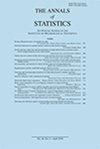Sparse SIR: Optimal rates and adaptive estimation
IF 3.2
1区 数学
Q1 STATISTICS & PROBABILITY
引用次数: 17
Abstract
Sliced inverse regression (SIR) is an innovative and effective method for sufficient dimension reduction and data visualization. Recently, an impressive range of penalized SIR methods has been proposed to estimate the central subspace in a sparse fashion. Nonetheless, few of them considered the sparse sufficient dimension reduction from a decision-theoretic point of view. To address this issue, we in this paper establish the minimax rates of convergence for estimating the sparse SIR directions under various commonly used loss functions in the literature of sufficient dimension reduction. We also discover the possible trade-off between statistical guarantee and computational performance for sparse SIR. We finally propose an adaptive estimation scheme for sparse SIR which is computationally tractable and rate optimal. Numerical studies are carried out to confirm the theoretical properties of our proposed methods.稀疏SIR:最优速率和自适应估计
切片逆回归(SIR)是实现充分降维和数据可视化的一种创新而有效的方法。最近,人们提出了一系列令人印象深刻的惩罚SIR方法,以稀疏方式估计中心子空间。然而,很少有人从决策理论的角度考虑稀疏充分降维问题。为了解决这一问题,本文建立了文献中各种常用损失函数在充分降维下估计稀疏SIR方向的极小极大收敛率。我们还发现了稀疏SIR的统计保证和计算性能之间可能存在的权衡。最后,我们提出了一种计算易于处理且速率最优的稀疏SIR自适应估计方案。数值研究证实了我们提出的方法的理论性质。
本文章由计算机程序翻译,如有差异,请以英文原文为准。
求助全文
约1分钟内获得全文
求助全文
来源期刊

Annals of Statistics
数学-统计学与概率论
CiteScore
9.30
自引率
8.90%
发文量
119
审稿时长
6-12 weeks
期刊介绍:
The Annals of Statistics aim to publish research papers of highest quality reflecting the many facets of contemporary statistics. Primary emphasis is placed on importance and originality, not on formalism. The journal aims to cover all areas of statistics, especially mathematical statistics and applied & interdisciplinary statistics. Of course many of the best papers will touch on more than one of these general areas, because the discipline of statistics has deep roots in mathematics, and in substantive scientific fields.
 求助内容:
求助内容: 应助结果提醒方式:
应助结果提醒方式:


